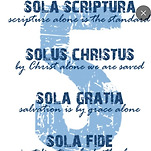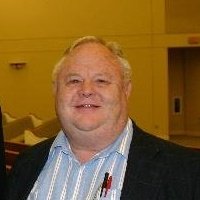|
존 프레임
출처: 갓피플몰 프린스턴 대학교(A.B.), 웨스트민스터 신학대학원(B. D.), 예일 대학교(A.M., M.Phil.)를 졸업하였고,필라델피아에 있는 웨스트민스터 신학대학원과 캘리포니아에 있는 동대학원에서 재직하였으며, 현재는 미국 오랜도에 위치한 개혁신학 대학(Reformed Theological Seminary)교수로서 조직신학과 철학을 가르치고 있다. 그는 신학, 변증학, 윤리학 그리고 예배에 관련된 많은 글들을 저술하였다. 그 저술에는 [주권에 관한 신학] (Theology of Lordship) 시리즈의 [하나님의 지식에 관한 교리] (The Doctrine of the Knowledge of God)가 포함되어 있다. 또한 [하나님의 영광에 대한 변증](Apologetics to the Glory of God)과 [코넬리우스 반틸: 그의 사상에 대한 분석] (Cornelius Van Til: An Analysis of His Thought)도 수록되어 있다.
[출처] 개혁신앙 개론(Introduction to the Reformed Faith) (캘거리 개혁신앙연구회(CKRIRF)) |작성자 주나그네 죤 프래임(Dr. John M. Frame)은 대표적인 현대 개혁신학자 중 한 사람으로 손꼽힌다. 그는 미국의 기독교 사상가, 칼빈주의 신학자로 알려져 있다. 특히 그의 스승 코르넬리우스 반틸 (Cornelius Van)의 학문적 계승자이기도 하다. 죤은 무려 31년간 웨스트 민스터 신학교(Westminster Theological Seminary)에서 조직신학, 변증학 교수를 역임하였다. 그동안 그가 잡지뿐 아니라 출판을 통해 발행한 서적만해도 수십,수백종에 달할 만큼 다작(多作) 신학자로 유명하다. 또한 피아노와 오르간 연주는 프로 수준급이며, 영화와 매체 비평에도 남다른 능력을 보인다. 한마디로 팔방미인 신학자이다. 현재(2005년 이후)는 미국의 올랜도(Orlando)에 있는 개혁신학교(Reformed Theological Seminary)에서 변증학과 기독교 역사 철학을 가르치고 있다.
개인적으로 그의 전제주의적 신학 방법(presuppositional theological method)에는 비평적 접근이 필요하다고 생각하지만, 그를 훌륭한 개혁신학자로 받아들이는데 큰 장애물이 될 정도는 아니다.
John Frame From Wikipedia, the free encyclopedia
For the bishop, see John Frame (bishop). For the cricketer, see John Frame (cricketer). For the sculptor, see John F. Frame.
John M. Frame (born 1939, Pittsburgh, PA) is an American philosopher and Calvinist theologian especially noted for his work in epistemology and presuppositional apologetics, systematic theology, and ethics. He is one of the foremost interpreters and critics of the thought of Cornelius Van Til.
[edit] BiographyFrame received degrees from Princeton University (A.B.), Westminster Theological Seminary (B.D.), Yale University (A.M. and M.Phil., though he was working on a doctorate and admits his own failure to complete his dissertation),[1] and Belhaven College (honorary D.D.)[2]. He has served on the faculty of Westminster Theological Seminary and was a founding faculty member of their California campus, and as of 2007[update] he holds the J. D. Trimble Chair of Systematic Theology and Philosophy at Reformed Theological Seminary in Orlando, Florida.[3] Frame married Mary Grace Cummings in 1984, and has two sons, Justin M. Frame and John A. Frame. He also has three stepchildren: Deborah, Doreen, and "Skip". Frame is well known in Reformed circles for his many books, chapters, and articles. He is also a classically trained musician and a critic of film, music, and other media. [edit] Relations to other scholarsFrame is known for his critical view of historical modes of theology, including his criticism of scholars such as David F. Wells, Donald Bloesch, Mark Noll, George Marsden, D.G. Hart, Richard Muller, and Michael Horton. One of his most well-known articles in this vein is titled "Machen's Warrior Children", which was originally published in Alister E. McGrath and Evangelical Theology: a Dynamic Engagement (Paternoster Press, 2003).[1] A more recent example is his review of Michael Horton's book Christless Christianity.[2] In 1998 Frame engaged in a student-organized debate with then librarian D.G. Hart concerning the regulative principle of worship.[3] Frame has used Doug Wilson's home-schooling materials with his own sons.[4] [edit] Multiperspectival epistemology
Main article: Multiperspectivalism
Frame has elaborated a Christian epistemology in his 1987 work The Doctrine of the Knowledge of God. In this work, he develops what he calls triperspectivalism or multiperspectivalism which says that in every act of knowing, the knower is in constant contact with three things (or "perspectives") ? the knowing subject himself, the object of knowledge, and the standard or criteria by which knowledge is attained. He argues that each perspective is interrelated to the others in such a fashion that, in knowing one of these, one actually knows the other two, also. His student and collaborator Vern Poythress has further developed this idea with respect to science and theology. Reformed theologian Meredith Kline wrote a critique of this view, explaining that Poythress and Frame had used multiperspectivalism in ways that had led to seriously incorrect conclusions in regards to the relation of Kline's position and Greg L. Bahnsen's on covenant theology (more specifically theonomy).[5] [edit] PresuppositionsAs a former student of Van Til, Frame is supporter of the presuppositionalist school of Christian apologetics. He defines a presupposition as follows:
[edit] Rationalism and irrationalism in non-Christian thoughtFrame, developing the thought of his mentor Cornelius Van Til, has asserted in both his Apologetics to the Glory of God and his Cornelius Van Til: An Analysis of His Thought that all non-Christian thought can be categorized as the ebb and flow of rationalism and irrationalism. [edit] RationalismIn this context Frame defines rationalism as any attempt to establish the finite human mind as the ultimate standard of truth and falsity. This establishing of the autonomous intellect occurs within the context of rejecting God’s revelation of himself in both nature and the Bible. A rationalist, in this sense, states that the human mind is able to fully and exhaustively explain reality. Yet, when Frame speaks of "exhaustive explanations" he does not mean these systems seek omniscience. Rather, He means that the history of non-Christian thought (though, admittedly, his focus is Western philosophy) is the history of various attempts to construct systems that account for everything (a distinctive metaphysic, epistemology and value theory). According to Frame, examples of attempts to explain reality are found in Plato and Aristotle's Form/Matter dualism; the debate between the nominalists and the realists over the status of universals and particulars, and the "all is... [fire, water, atoms,etc]" of the pre-Socratics. More examples would include Descartes' Mind/Body dualism, Spinoza's God or nature, and Leibniz's monadology, Plotinus' "The One" and his teaching on emanation, the British empiricists' attempts to limit knowledge and possibility to that which can be empirically verified, Kant's worlds of the noumena and the phenomena, and Hegel's dialectic. Frame has stated that Intelligent Design is "as scientific, and just as religious, as" neo-Darwinism.[6] [edit] IrrationalismNon-Christian thought, in Frame's view, also is characterized by irrationalism because inevitably the finite and fallen human mind cannot fully capture all of reality into a man-made system. On this position, at the point in which the non-Christian rationalist realizes that they cannot account for everything, they engage in what Francis Schaeffer called an "upper story leap." As a brief example, Frame uses the epistemology of Kant, who taught that the categories of thought that are necessary for our understanding the world around us, such as causality, logic, time, space, and order, are structured by our minds and imposed upon the things we experience. In order to be rational and make sense out of life we must assume, or presuppose, these notions. Because we cannot empirically verify these categories by touch, smell, sight, etc. they must be thought of as created by and arising from our minds, thus ordering and providing the criterion for those things that we can empirically verify. This led Kant to conclude that if we are to think of anything at all we must think in terms of everything being caused by something logically and temporally prior to it. This led to a fairly deterministic view of mankind. Frame asks where we can find moral responsibility and freedom in Kant's scheme. He argues that Kant believed that while we couldn't prove that man was a responsible moral agent we must nevertheless act as though this were the case. Philosophers have described these as Kant’s "two worlds" ? the world of nature (which leads to determinism), and the world of freedom (where responsibility is found). Kant himself spoke of the "starry skies above" and the "moral law within", and although Kant did not deny the regularity of the natural world and the reality of humanity’s "moral motions," his philosophy could not bring these two worlds together. Frame concludes that Kant made the "upper story leap" to irrationalism by asserting the truth of something with no rational justification. Thus, in Immanuel Kant, Frame finds both rationalism and irrationalism. Likewise, according to both Frame and Van Til, every non-Christian system contains what Jacques Derrida calls "alterity", that is each system contains the very principles for its downfall. They all "auto-deconstruct." [edit] Worship and musicFrame has written two books on worship and music. These have provoked controversy as Frame interprets the regulative principle of worship (which he subscribes to) in a non-conventional manner. Frame regards contemporary worship music, musical instruments and liturgical dance as permissible, which has brought him into conflict with some Reformed theologians who regard them as forbidden in worship. [edit] Selected works
[edit] Theology of Lordship series
[edit] References
[edit] External links
View page ratings
Rate this page
Rate this page
Page ratings
Current average ratings.
Saved successfully
Your ratings have not been submitted yet
Your ratings have expired
Thanks! Your ratings have been saved.
Thanks! Your ratings have been saved.
An account will help you track your edits, get involved in discussions, and be a part of the community. or Thanks! Your ratings have been saved.
Categories: 1939 births | Living people | American Presbyterians | Calvinist philosophers | Calvinist ministers and theologians | American theologians | American academics | Christian apologists | People from Orlando, Florida | Westminster Theological Seminary alumni | Westminster Theological Seminary faculty | Christian ethicists | Christian philosophers | American Calvinists | Calvinist artists and writers |
|||||||||||||||||||||||||||||||||||||||||
출처: 생명나무 쉼터 원문보기 글쓴이: 둥지


